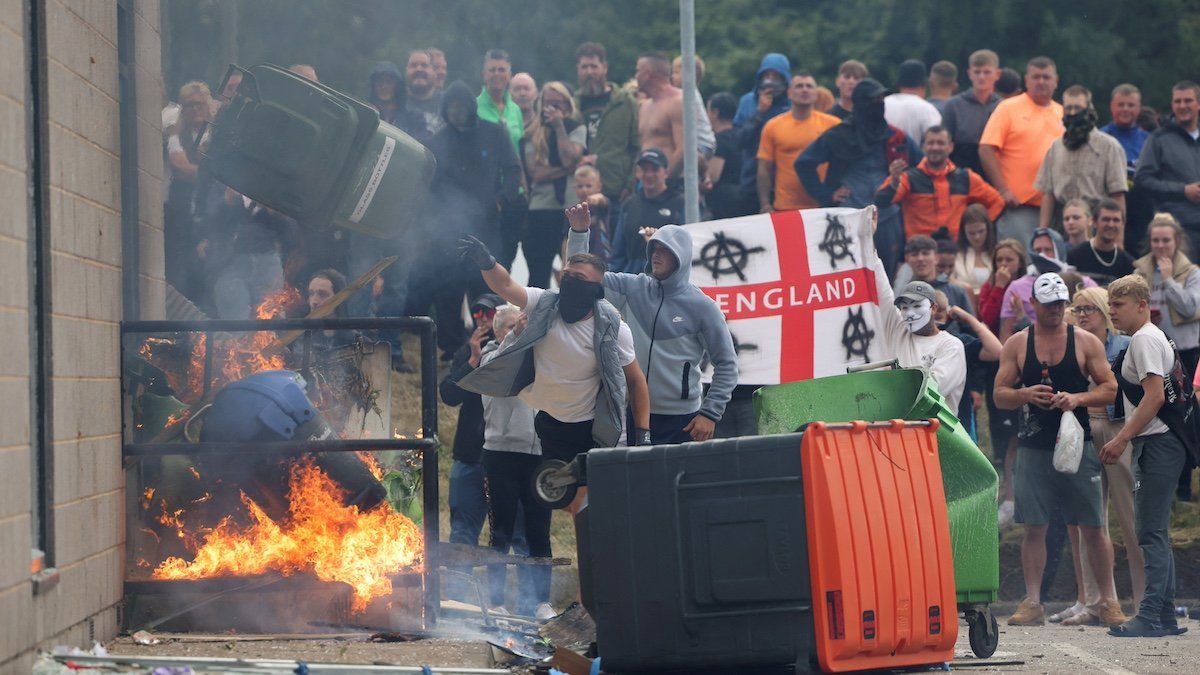90: Police arrested 90 people as anti-immigration, far-right protesters took to the streets of UK cities this weekend, sowing chaos in Hull, Liverpool, Bristol, Manchester, Stoke-on-Trent, Blackpool, and Belfast. Racial tensions spiked after the murders of three young girls at a Taylor Swift-themed party in Southport last week. The suspected killer was falsely rumored to have been a Muslim immigrant (he was, in fact, born in Wales to Rwandan Christian parents). This weekend’s violence and clashes with police led to scores of arrests, and PM Keir Starmer has vowed to tackle the “far-right hatred” sowing unrest on British streets.
12: Japan’s stock market had its worst day in 37 years on Monday, dropping 12% on news of a possible US recession. This followed the Nikkei’s 5.8% drop from Friday and is leading a global stock-market selloff today amid fears that the Federal Reserve may not have responded quickly enough to a slowing US economy by cutting interest rates.
2: Two people were killed in a tunnel collapse in southwestern China on Saturday. The tragedy occurred just two weeks after at least 38 people died after a bridge in northwestern China partially collapsed, plunging vehicles into a river. Two dozen people remain missing from that incident, and both accidents have raised concerns about the country’s infrastructure.
4B: Hawaii Gov. Josh Green’s office has announced that a deal in principle — for just over $4 billion — has been reached to settle roughly 450 legal cases linked to the August 2023 wildfires in the Aloha State. Seven defendants were named in the suit — including the State of Hawaii, County of Maui, Hawaiian Electric, Kamehameha Schools, West Maui Land Co, Hawaiian Telcom, and Spectrum/Charter Communications — over the blazes that destroyed the historic town of Lahaina and killed more than 100 people.
32: Somali authorities say al-Qaida affiliate al-Shabab killed 32 people and injured scores more Friday at a beach hotel in Mogadishu. Another seven people were reportedly killed by a roadside bomb in an attack just outside the capital on Saturday. Somali President Hassan Sheikh Mohamud declared a “total war” on the militants last year, but al-Shabab still controls parts of the country, and Friday’s violence notably followed Somalia’s third phase of a drawdown of peacekeeping troops under the African Union Transition Mission.
2: In a video released on Friday, two men claiming to be Russian nationals say they were taken captive by al-Qaida-linked militants in northeastern Niger. One man called himself Yury and said he was a geologist working for a Russian firm in the region when armed men detained him. This could be the first time jihadis have kidnapped Russians in the Sahel, but outlets have yet to confirm the identities of the men.
3: We’ve seen a lot of great footage from the Summer Games in Paris this past week — everything from
Simone Biles and
Katie Ledecky racking up their piles of gold to
Snoop Dogg’s Greatest Hits (and a
swim lesson with
Michael Phelps). But three countries have celebrated some impressive Olympic firsts this past week.
Julien Alfred won the
first-ever Olympic medal for St. Lucia on Saturday, racing to gold in the women’s 100-meter dash. That same day,
Thea LaFond did the same for Dominica, nabbing the Caribbean island nation its first medal — and the gold — in the women’s
triple jump. And
Kaylia Nemour won Algeria its
first gold in gymnastics, beating the competition on the uneven bars on Sunday.
